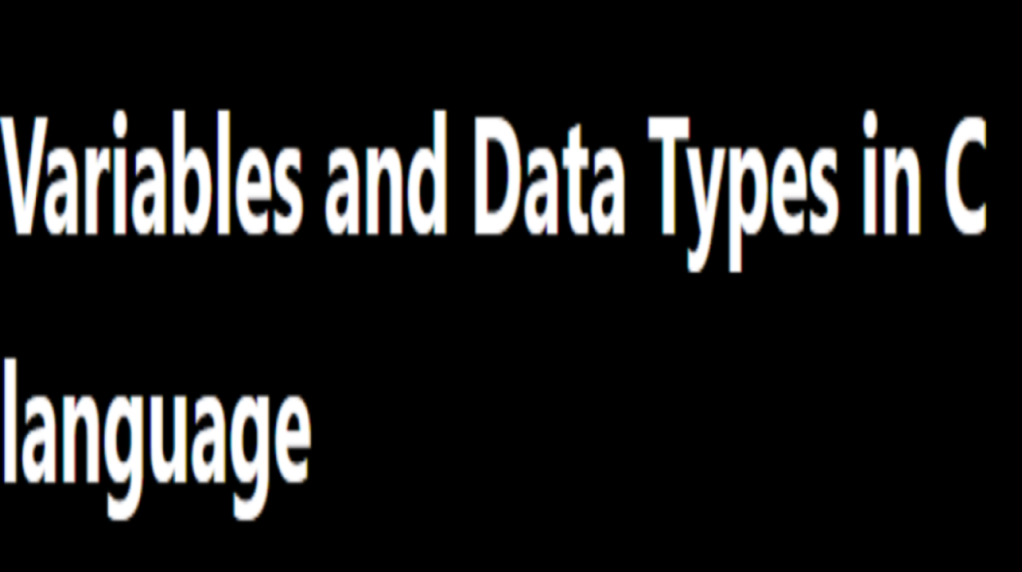Variables and Data Types in C language
In computer programming, a variable is a named storehouse position that stores a value or a data type. Variables are used to temporarily hold and manipulate data during the prosecution of a program.
Variables and Data Types
Variables
Variables can be assigned values or modified throughout the program, and their values can be used in computations or in other corridor of the program. For illustration, a program that calculates the sum of two figures might use variables to store the values of the two figures and the sum of a number is:
| Code
int num1 = 5; // declaring and initializing the first number |
Then,” num1″ and” num2″ are integer variables that store the values 5 and 7, independently. The” sum” variable is also an integer and stores the value 12, which is the sum of” num1″ and” num2.”
Variables play a pivotal part in programming and are used considerably in utmost programming languages, including C language. They give a way to store and manipulate data at runtime, enabling programs to be more flexible and dynamic. In C language, there are different types of variables, similar as integers, floating- point figures, characters, and arrays, among others.
Variables can also be scoped in C language, which means that they can be declared and used within a specific block of law.
Variables in C language can also have different storehouse classes, which determine how and where the variable is stored in memory.
There are four storehouse classes in C language automatic, static, register, and extern:
1. Automatic variables:
Automatic variables are the most common type of variable and are declared inside a function or block of law. They’re created when the function or block of law is entered and are destroyed when the function or block of law exits. Automatic variables are generally stored in the mound memory and have a limited compass.
2. stationary variables:
stationary variables, on the other hand, are declared inside a function or block of law but retain their value indeed after the function or block of law exits. They’re stored in the data member of memory and have a larger compass than automatic variables.
3. Register variables:
Register variables are analogous to automatic variables but are stored in CPU registers rather of the mound memory. This can ameliorate the performance of the program by reducing the number of memory accesses needed to pierce the variable.
4. Extern variables:
Extern variables are declared outside of any function or block of law and can be penetrated by multiple functions or source lines.
Variable declaration
Variable Protestation is a process in computer programming where a programmer defines a variable’s name and its data type, which the program will use to store a value.
In utmost programming languages, variables must be declared before they can be used. Once declared, the programmer can assign a value to the variable, and the program can also use that value throughout its prosecution.
The syntax for variable protestation varies depending on the programming language, but it generally involves specifying the data type followed by the variable name.
For example in C language, the syntax for declaring an integer variable named” age” is
| Code
int age; |
Then,” int” is the data type, and” age” is the variable name. In some programming languages, similar as Python, the data type of the variable is determined automatically grounded on the value assigned to it.
Data Types in C Language
C language supports several data types that can be used to declare variables.
Some of the most generally used data types are Integers:
1. Integers:
Integers are whole figures that can be either positive or negative. In C, there are four integer data types housekeeper( 1 byte) short int( 2 bytes) int( 4 bytes) long int( 4 or 8 bytes)
2. Floating:
Floating Point figures Floating- point figures are figures with decimal points or fragments. In C, there are two floating- point data types pier( 4 bytes) double( 8 bytes)
3. Characters:
Characters are single letters or symbols that are enclosed in single quotations(”). In C, a character is represented by the housekeeper data type, which is one byte in size.
4. Boolean:
The Boolean data type is used to represent logical values. It has two possible values true( 1) and false( 0).
5. Void:
The void data type is used to indicate the absence of any value. It’s generally used in functions that don’t return any value.
Conversion
there are two types of conversion in c programming language:
Implicit type conversion VS unambiguous type conversion
1. Implicit type conversion( also known as coercion) Implicit type conversion occurs automatically when a value of one data type is assigned to a variable of another data type. For illustration, if you assign an integer value to a pier variable, the integer value will be converted to a floating- point value.
2. unambiguous type conversion( also known as casting) unambiguous type conversion, on the other hand, is a manual process that involves the use of casting motorists.
